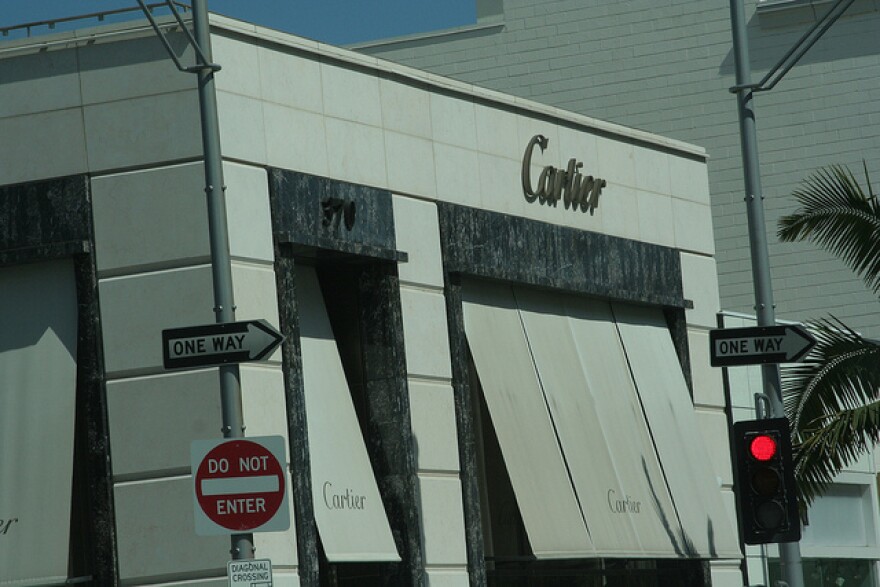With our free press under threat and federal funding for public media gone, your support matters more than ever. Help keep the LAist newsroom strong, become a monthly member or increase your support today during our fall member drive.
This archival content was written, edited, and published prior to LAist's acquisition by its current owner, Southern California Public Radio ("SCPR"). Content, such as language choice and subject matter, in archival articles therefore may not align with SCPR's current editorial standards. To learn more about those standards and why we make this distinction, please click here.
Feeling Down? Science Says Go Shopping (But Use Credit)

Retail therapy: It's the answer for almost any problem. Girlfriend broke up with you? Didn't get that promotion? Buy yourself something pretty. People like to shop, especially for high-status items, when they're feeling down. Decades of research has indicated that when a key feature of one's identity is threatened - such as by being passed over for a promotion or being dumped by a former lover - people turn to things. Possessions can allow us to signal our awesomeness to others. And if others think we're awesome, then we just might begin to remember just how awesome we are in the first place.
For example, in one experiment, people who were sad (but not clinically depressed) were willing to pay more for various products than participants who were emotionally neutral. In other words, their decision-making processes were skewed away from making optimal economic choices (maximizing profits and minimizing losses), in favor of the more immediate goal of changing their mood. So, we head to the mall in an effort to bring our self-esteem back to normal levels.
But parting with cash is also a painful process, so what gives? In a new paper in the journal Social Psychological and Personality Science, researchers Niro Sivanathan of the London Business School and Nathan Pettit of Cornell University describe how they think people resolve this conflict. Their answer: credit cards. Pettit and Sivanathan studied whether people might be more likely to use a credit card when engaging in retail therapy.
First, they wanted to find evidence that people were more likely to spend with credit than with cash when their self-esteem had been threatened. 160 college-age students were given a test that measured their spatial reasoning and logic ability. After the test, they were told how they had scored on the test. Actually, their performance on the test was irrelevant: half of the students were simply told that they scored in the 12th percentile (meaning they performed worse than 88% of students their age), and half were told that they scored in the 88th percentile (meaning they performed better than 88% of students their age). If Pettit and Sivanathan are right, then the students who had been made to feel stupid should have been more likely to opt to pay for "a consumer product that [they had] been considering purchasing" with credit rather than with cash. And this is exactly what they found.
A second experiment probed a bit deeper. Is the preference for credit universal, or does it only apply to some kinds of purchases? This time, the researchers had 150 university students think about paying a pair of jeans. Half of them were asked to think about pricey, high-status, designer jeans, and the other half were told to think about regular low-price jeans. Then they were given the same "spatial reasoning and logic ability" test that the students from the first experiment completed. As expected, those who had their self-esteem threatened were 60% more likely to prefer to buy the jeans with credit. This simply replicated the initial finding. Even more interesting, though, was that the effect was only found for the expensive jeans. More specifically, when cash was the only option, the threatened students were no more likely to purchase the high-status jeans than were the non-threatened participants.
Taken together, these findings validate Pettit and Sivanathan's initial hypothesis. "These results," they wrote, "suggest that when individuals are under self-threat, and therefore seeking to repair their wounded egos, they increase their spending on compensatory high-status goods only when the psychological cost of payment can be minimized" (emphasis added). In other words, retail therapy only works when high-status items can be purchased on credit.
What does it all mean? This is one of the first scientific studies that investigated the impact of self-threat on both what people buy as well as how they buy it. The researchers found that the more people were able to separate the pleasure of shopping from the pain of spending, the more they were likely to "seek solace in high-status goods." Critically, this model offers a suggestive explanation for the 2008 American "credit crisis."
The increases in credit card debt among those with lower incomes might be explained, at least partially, by the fact that their financial reality caused them to rely on credit for purchases of luxury items meant to signal their status to others. Individuals with lower socioeconomic status often have lower self-esteem and, ironically, these individuals are more likely to buy expensive things to repair their low self-esteem. All of this despite the fact that they can't afford those purchases in the first place. And the relaxed lending policies that were in place didn't help! Indeed, the researchers noted, "together, the desire to affirm the self by consuming high-status goods, the preference to do so with credit, and the increased availability of credit among the income constrained may have come together to create optimal conditions for those who could least afford superfluous expenditure to spend more through particularly costly means (credit)." If economic regulators want to prevent future similar credit crises, they might consider a lesson in consumer psychology and make it harder, not easier, for those with lower incomes to rely on credit.
Nathan C. Pettit, & Niro Sivanathan (2011). The Plastic Trap: Self-Threat Drives Credit Usage and Status Consumption Social Psychological and Personality Science, 2 (2), 146-153 : 10.1177/1948550610385138
The original journal article is available free for a limited time.
At LAist, we believe in journalism without censorship and the right of a free press to speak truth to those in power. Our hard-hitting watchdog reporting on local government, climate, and the ongoing housing and homelessness crisis is trustworthy, independent and freely accessible to everyone thanks to the support of readers like you.
But the game has changed: Congress voted to eliminate funding for public media across the country. Here at LAist that means a loss of $1.7 million in our budget every year. We want to assure you that despite growing threats to free press and free speech, LAist will remain a voice you know and trust. Speaking frankly, the amount of reader support we receive will help determine how strong of a newsroom we are going forward to cover the important news in our community.
We’re asking you to stand up for independent reporting that will not be silenced. With more individuals like you supporting this public service, we can continue to provide essential coverage for Southern Californians that you can’t find anywhere else. Become a monthly member today to help sustain this mission.
Thank you for your generous support and belief in the value of independent news.

-
Metro officials said it will be able to announce an opening date “soon.”
-
While working for the county, the DA’s office alleges that 13 employees fraudulently filed for unemployment, claiming to earn less than $600 a week.
-
The L.A. County Board of Supervisors on Tuesday voted to declare immigration enforcement actions a local emergency.
-
Tens of thousands of workers across Southern California walk out over pay and staffing issues.
-
People in and around recent burn scars should be alert to the risk of debris flows. Typical October weather will be back later this week.
-
Jet Propulsion Laboratory leadership says the cuts amount to 11% of the workforce.







